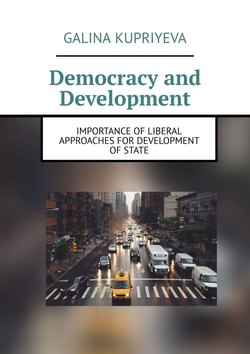Читать книгу Democracy and Development. Importance of liberal approaches for development of State - Galina Kupriyeva - Страница 4
THEORETICAL FRAMEWORK
ОглавлениеOlle Tornquist, in “Politics and Development” argues that in reality, politics and development come together. He considers that after the Cold War, many disputes and interests of anti-colonial and anti-imperialists struggles that delay progress of development in Third World countries became a history. In addition, developing countries differ from one another. Therefore, for these countries, specific political approach should be adopted, that addresses to interaction of both economic and political aspects. The author argues that the models of growth that were applied in Third World countries during the Cold War, were oriented on changes by political means. Such models include development projects based on “Nation-State” and “Statism” (or Import Substitution Industrialization), with the interference of government into economy and market, that lead to failure of development in this countries.
The main critique of public intervention stems from Neoclassical theories. Firstly, P.T.Bauer (1972 and 1987), generalizing from his experience in India, considered “…government failure, i.e.corruption and mismanagement, more critical than market failure, …intervention caused and did not cure market imperfections.”2 Secondly, Scitovsky and Scott (1970) showed inefficiency of public intervention – “…the incentives they created were highly unequal for different economic actors.”3 Thirdly, the success of export-oriented countries support the claims of Harry Johnson’s (1967) and Ann Kruger (1984) about free trade as the point of departure for dynamic reasons.
More recent neoclassical political economists, basing on models of state intervention, sought to show inefficiencies in such state-market relations. In that way, Mancur Olson (1982) showed how interactions are inefficient in small groups where each individual pursue his own self-interest, and because of the presence of free-riders, people are unlikely to organize themselves in collective (or national interest). Another scholar – Buchanan (1980) and “public choice” school focuse on profit-seeking by government and the emergence of monopoly. In general, recent neoclassical theories accepted fusion of economic and political spheres, with a minimal role of government.
In course of time, with the economic development, older traditional social and economic forms live out itself and new social forces emerge that seek changes and orient toward globalization. In support to the neoclassical theorists, Howard J. Wiarda considers the evidence of transition to democracy in developing world. Among the reasons of this transition, there are 4 factors: failure of Authoritarianism, the end of the Cold War, Globalization and Elite leadership.
It might be seen, that in some cases, notably, under authoritarian regimes, demands for change can lead to repression. However, in the long run, they can start democratization. As such, Authoritarianism and Marxism in the early stages of development are possible and useful. They help generate development, but, in case of scale economies, they stimulate the demand for democracy. “In other words, democracy eventually comes to Third World nations both as an ideological preference and, perhaps more importantly, as a pragmatic, more effective response to the demands of modernization.”4 Authoritarianism and Marxism-Leninism, at early stages, were considered as the main alternatives to Democracy. Authoritarianism, while seemed promising as a way to achieve development, occurred to be corrupt and ineffective. The main purpose of Marxism-Leninism was to provide the authority and discipline in masses that seemed necessary for achieving industrialization, but along with corruption and ineffectiveness, it had very low human rights record. Thus, still, Democracy left as the only solution.
Another factor that motivated Democratization is the end of the Cold War. During this period characterized by bipolarity, authoritarian regimes were preferred due to their effectiveness in keeping stability and order in Third World countries. But today, with the failure of communism, the policy of “Containment” has gone and democratic regimes are the guarantors of long-term stability and good government.
2
Helen Shapiro and Lance Taylor, ch.21 “State and Industrial Strategy”, in Jameson and Wilbar, p.330.
3
Helen Shapiro and Lance Taylor, ch.21 “State and Industrial Strategy”, in Jameson and Wilbar, p.330.
4
Wiarda, Chapter 5, Transitions to Democracy in the Developing World
